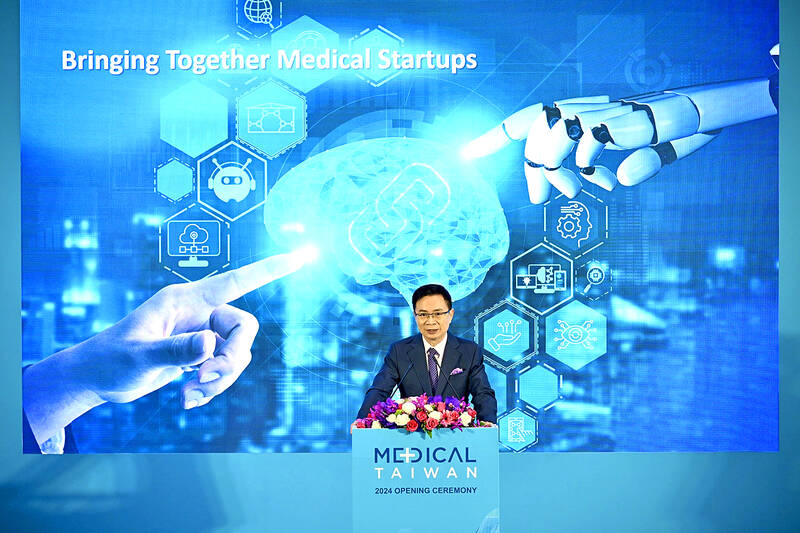Medical Taiwan kicked off yesterday at Taipei Nangang Exhibition Center’s Hall 2, featuring 280 companies from 10 countries showcasing a range of innovations, including artificial intelligence (AI)- powered health care products.
This year, the event has seen a 10 percent increase in exhibitors from last year and over 800 registered international buyers in attendance, according to James Huang (黃志芳), chairman of the Taiwan External Trade Development Council (TAITRA, 外貿協會), which organized the three-day expo.
As AI technology evolves, it will play a pivotal role in the health care industry, Huang told the expo’s opening ceremony, adding that medical diagnosis accuracy and patient care quality can be greatly enhanced through the use of AI technology.

Photo courtesy of Taiwan External Trade Development Council
In addition, AI will also assist with early prevention and precise treatment as Taiwan faces the challenge of an aging society, Huang said.
In the digital health and sustainable future healthcare and the “M-novator Startups Pitch” exhibition zones, many companies have launched AI solutions for elderly care, health monitoring and smart diagnosis, Huang said.
Some of the notable offerings on show included Decentralized Biotechnology Intelligence Co’s (矽響先創) “StethoCloud AIoT” wearable stethoscope, an intelligent drive that detects and records users’ heartbeat status throughout the day, and HPB Hi-Tech Corp’s (合錦科技) “Ezcaring P1” high-privacy AI caring system, which safeguards the independent living of the elderly through technology, he said.
The Taipei Office of the Japan-Taiwan Exchange Association has organized a Japanese pavilion for the first time in this year’s expo to exhibit healthcare apps for the elderly, Huang said.
The event provides a comprehensive display of technological advancements and solutions across the entire medical industry chain, including a range of innovative products and services, showcasing the robust capabilities of Taiwan’s medical device industry, Ministry of Economic Affairs Chief Secretary Yang Chih-ching (楊志清) said at the opening ceremony.
Medical Taiwan expo highlights three essential themes, “All Age Healthcare,” “Smart Medical” and the “Supply Chain Gallery,” gathering Taiwan’s leading medical device suppliers and smart healthcare companies, including Pacific Hospital Supply Co (太平洋醫材), BenQ Materials Corp (明基材料), Chang Gung Medical Technology Co (長庚醫學) and Advantech Co (研華), the TAITRA said.
Advantech presented the AMiS-850 electronic drug storage cabinet, featuring electric height adjustment for enhanced mobility, it said.

Quanta Computer Inc (廣達) chairman Barry Lam (林百里) is expected to share his views about the artificial intelligence (AI) industry’s prospects during his speech at the company’s 37th anniversary ceremony, as AI servers have become a new growth engine for the equipment manufacturing service provider. Lam’s speech is much anticipated, as Quanta has risen as one of the world’s major AI server suppliers. The company reported a 30 percent year-on-year growth in consolidated revenue to NT$1.41 trillion (US$43.35 billion) last year, thanks to fast-growing demand for servers, especially those with AI capabilities. The company told investors in November last year that

Intel Corp has named Tasha Chuang (莊蓓瑜) to lead Intel Taiwan in a bid to reinforce relations between the company and its Taiwanese partners. The appointment of Chuang as general manager for Intel Taiwan takes effect on Thursday, the firm said in a statement yesterday. Chuang is to lead her team in Taiwan to pursue product development and sales growth in an effort to reinforce the company’s ties with its partners and clients, Intel said. Chuang was previously in charge of managing Intel’s ties with leading Taiwanese PC brand Asustek Computer Inc (華碩), which included helping Asustek strengthen its global businesses, the company

Taiwanese suppliers to Taiwan Semiconductor Manufacturing Co. (TSMC, 台積電) are expected to follow the contract chipmaker’s step to invest in the US, but their relocation may be seven to eight years away, Minister of Economic Affairs J.W. Kuo (郭智輝) said yesterday. When asked by opposition Chinese Nationalist Party (KMT) Legislator Niu Hsu-ting (牛煦庭) in the legislature about growing concerns that TSMC’s huge investments in the US will prompt its suppliers to follow suit, Kuo said based on the chipmaker’s current limited production volume, it is unlikely to lead its supply chain to go there for now. “Unless TSMC completes its planned six

TikTok abounds with viral videos accusing prestigious brands of secretly manufacturing luxury goods in China so they can be sold at cut prices. However, while these “revelations” are spurious, behind them lurks a well-oiled machine for selling counterfeit goods that is making the most of the confusion surrounding trade tariffs. Chinese content creators who portray themselves as workers or subcontractors in the luxury goods business claim that Beijing has lifted confidentiality clauses on local subcontractors as a way to respond to the huge hike in customs duties imposed on China by US President Donald Trump. They say this Chinese decision, of which Agence